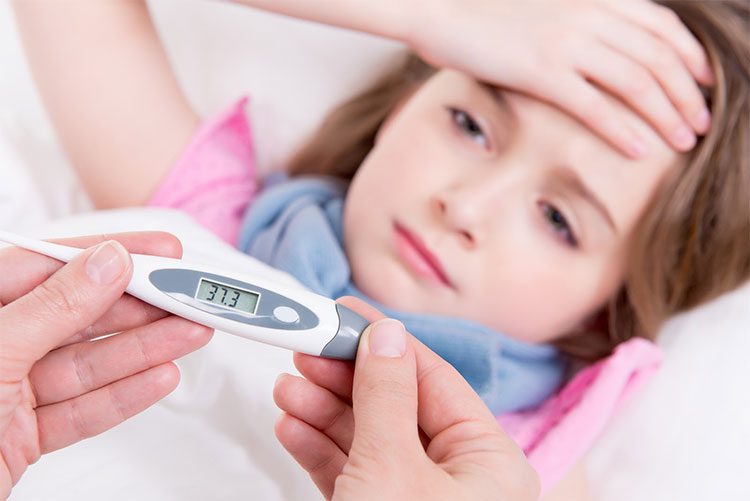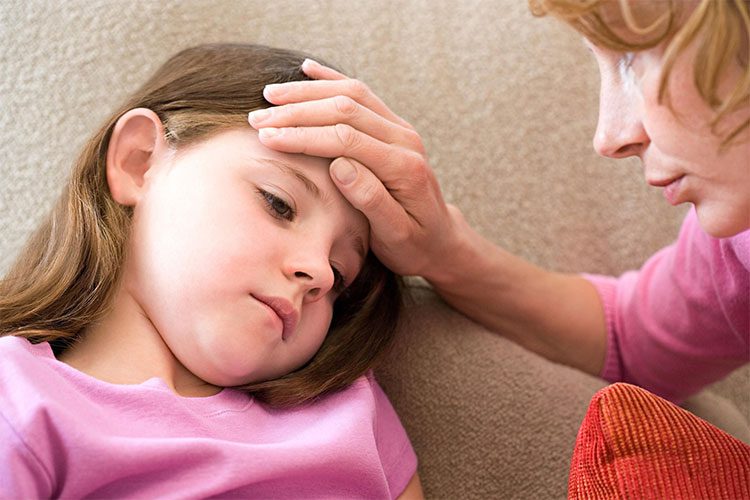Viral fever, also known as viral flu, is commonly caused by various types of viruses, the most prevalent being respiratory viruses. The cause of the illness is attributed to erratic weather conditions that facilitate the proliferation of these harmful viruses. Children, with their weaker immune systems, are more susceptible to illness than adults.
Typically, viral fever is a contagious disease; the virus can spread from one person to another, especially through respiratory and digestive routes. Therefore, if someone exhibits symptoms of a viral fever, they should limit contact with others to prevent spreading it to family and those around them. Importantly, do not share bowls, spoons, or plates with healthy individuals.
To prevent viral fever, it is essential to boost the body’s immune system by consuming a well-balanced diet rich in nutrients, particularly vitamins from fruits, and maintaining a reasonable work and rest schedule. Personal hygiene and cleanliness in one’s living environment should also be prioritized.

A balanced diet and good personal hygiene are the best ways to prevent illness.
Symptoms of Viral Fever
- High fever; patients may experience acute respiratory infections: sore throat, reddened and swollen throat, coughing, runny nose, and general body aches.
- Digestive disturbances may lead to diarrhea.
- Swollen lymph nodes in the head, face, and neck.
- Rashes, with small red spots appearing 2-3 days after the fever.
- Red eyes, conjunctivitis…
- Headaches: A sensation of dizziness accompanied by severe headaches.
- Frequent chills.
- Fatigue.
- Muscle aches.
Home Care for Patients with Viral Fever
Typically, patients with viral fever can recover within 5-7 days of treatment. In many cases, patients can be cared for at home. Family members should ensure the following steps:
- Provide the patient with a nutritious diet and regularly monitor their temperature.
- To reduce fever: administer antipyretics and oral rehydration solutions as advised by a doctor.
If a child has a fever, immediate medical attention is necessary if the following signs occur:
- High fever above 38.5 degrees Celsius, especially above 39 degrees Celsius, that does not respond to antipyretics.
- The child appears lethargic, drowsy, experiences headaches, and has increasing convulsions…

When a child has a fever, they need to be monitored closely to prevent dangerous complications.
Note: Do not self-administer intravenous fluids without a doctor’s prescription, as there is no scientific evidence that any medication can boost immunity in just a few days, including intravenous fluids. In cases of fever, if hydration seems to help immediately, it is merely coincidental. In cases of dehydration, oral rehydration is still the best method. If intravenous fluids are necessary, the doctor must carefully calculate the dosage; it cannot be arbitrary, as this could worsen the condition.
Common Complications of Viral Fever
If not detected early and treated promptly, the illness can lead to serious complications such as:
- Pneumonia: This is a severe complication that can erupt into an epidemic with complex and dangerous developments.
- Bronchiolitis: Common in children under 1 year old, this is also a very serious complication that can occur in young children.
- Laryngitis: Swelling of the larynx can cause difficulty breathing and stridor in children.
- Myocarditis, causing arrhythmias and cardiac arrest: If a child remains fatigued, lethargic, and does not engage in play or eat after the fever subsides, parents should be cautious. The most concerning aspect is that the illness can lead to complications in the brain, with the child experiencing seizures, coma, and potentially severe long-term consequences.
Preventing Viral Fever
According to Nurse Le Thi Hang from the Digestive Infectious Diseases Department (A4B), to prevent the illness, the public should:
- Consume a balanced diet, eat regularly, and scientifically to enhance physical condition and immune system.
- Maintain good personal hygiene, wash hands before eating and after using the restroom.
- Create a clean and airy living and working environment to prevent the entry and development of pathogens.
- Engage in daily exercise to boost health.
- Ensure full vaccination, especially for children.
- Avoid contact with sick individuals or those showing symptoms of illness.
- Refrain from crowded places during outbreaks.
- When sneezing or having a runny nose, cover your mouth with your hand or a tissue to prevent spreading germs.
“Viral fever is a common illness that is not overly dangerous, so it is essential for everyone to understand it well. This is also the best way to protect oneself and those around them effectively,” Nurse Le Thi Hang stated.



















































